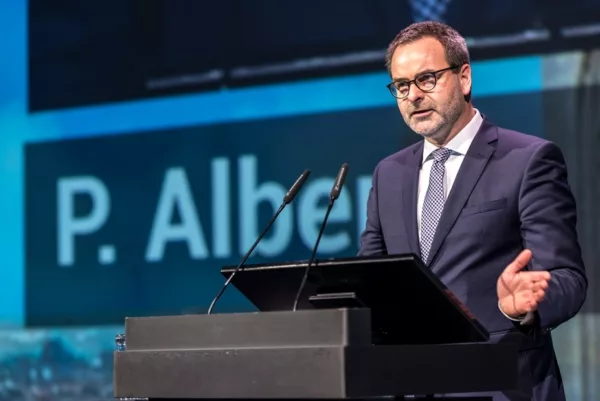EMUC18: Finding durable solutions in prostate cancer management
The four-day 10th European Multidisciplinary Congress on Urological Cancers (EMUC18) to be held in Amsterdam from 8 to 11 November.
Although in Europe the debate has begun on how to deliver uniform and quality care for prostate cancer (PCa) patients, healthcare experts and physicians are encountering deeply-rooted issues that range from financial costs, poor patient recruitment in key trials to the lack of a wider consensus on significant clinical dilemmas.
“In view of increasing costs for systemic treatment (also in prostate cancer), including individualized diagnostics like PSMA PET/CT and newly developed radionuclide tracers, the debate on how to deliver this kind of high-level care to every patient throughout Europe has started,” said Prof. Dr. Peter Albers, Chairman of the Department of Urology at Düsseldorf University Hospital (DE).
Albers is one of the speakers in the four-day 10th European Multidisciplinary Congress on Urological Cancers (EMUC18) to be held in Amsterdam from 8 to 11 November. He will give an update on the EAU Prostate Cancer Centre Consensus Meeting, a multidisciplinary initiative that aims to consolidate expert opinion on a range of PCa issues.
“It is very hard to really define “good care.” We tried to agree on important topics that include quality of care, diagnosis and treatment of patients with prostate cancer. The paper that will be published summarises the necessary prerequisites that are realistic throughout Europe in spite of very different healthcare settings,” he explained.
According to Albers, a minimum number of patients treated with prostate cancer at all stages and a minimum number of personnel and infrastructure was agreed on and will now be conveyed and discussed with healthcare politicians in Europe. The consensus is aimed to prompt a more efficient delivery of quality care to PCa patients, enabling physicians and healthcare workers to be guided by evidence-based recommendations and to access information on best clinical practices.
Running into barriers
But the challenge of delivering quality care to PCa patients is not as simple as it sounds due to financial constraints and the lack of uniformity in Europe when it comes to health infrastructure and clinical practices.
Albers said that although the discussion on specialized centres for the diagnosis and treatment of prostate cancer may be one way to introduce personalized healthcare to PCa patients, the opportunity may remain elusive particularly in less developed countries struggling with meagre resources.
“In many places, high-class care has already been realized. Let’s take the German Comprehensive Cancer Centres (CCC) of Excellence, or some really large cancer centres in the UK, Italy or France as examples. However, the costs of these MDT practising centres are enormous,” Albers noted. “We have analysed for Germany that a CCC has running costs per year of more than 10 million euros just for personnel and logistics. In some cases, this burns down to quality issues; for example, the tumour boards need to be organised with experts and specialists and not with rather inexperienced doctors.”
He underscored that it is crucial that the initial decision who to treat is consented by a group of experts and not novice physicians.
“This (process) however is very costly. In addition, I would require nursing staff to be present at those boards and at least one doctor should know the patient in person. The pure documentation of the current healthcare status is not perfect and a treatment decision, for example, pro or con surgery like cystectomy, has to be based on a very personal and detailed assessment of the individual patient. In reality, this is hard to accomplish and we need personnel and resources at this crucial step,” explained Albers.
Patient subgroups
On the other hand, there are some areas for optimism such as new developments in treatment approaches and diagnostics.
“Patients with metastatic prostate cancer have experienced a tremendous survival advantage over the last 10 years. For many of these patients, prostate cancer has become, so to speak, a chronic disease. We need to improve on these developments and this is only possible by further breaking down the treatment to subgroups of patients, for example, those with DNA repair defects,” he said.
“In addition, palliative care of patients is still not always perfect and as urologists, we have the obligation to also deliver state-of-the-art palliative care for these patients. Things have improved but are not perfect yet,” he added.
Interdisciplinary care
A congress like EMUC, according to Albers, can do a lot to help improve multidisciplinary approaches in diseases as complex as prostate cancer.
“True interdisciplinary oncological care is time-consuming, expensive and is not standard in all uro-oncological departments throughout Europe. A meeting like EMUC certainly will stress the importance of high-level oncological care. Cancer specialists are not only physicians but also healthcare workers, oncological nurses and other caregivers. All this needs to be discussed on an international congress like EMUC. This certainly will improve oncological care in urology throughout Europe,” he said.
There are also outstanding issues that require a collective assessment.
“Large databases and analysis with the help of registries are necessary to sort out special groups that demand more research like CRPC with bone metastases. Also in earlier stages of the disease, major clinical questions are not sufficiently answered such as the extent of lymph node dissection in intermediate-risk PCa patients. Only collaborative research with well-documented patients may help to improve on this situation,” Albers said.
Want to know more about EMUC18?
Explore this meeting website www.emuc18.org for details on the Scientific Programme, educational activities, and registration fees.



